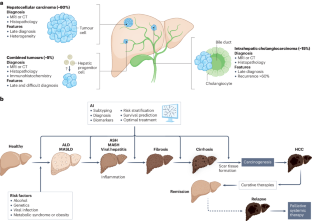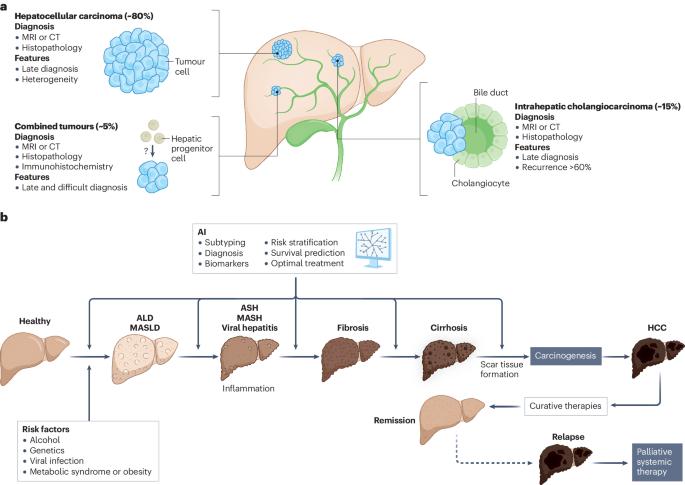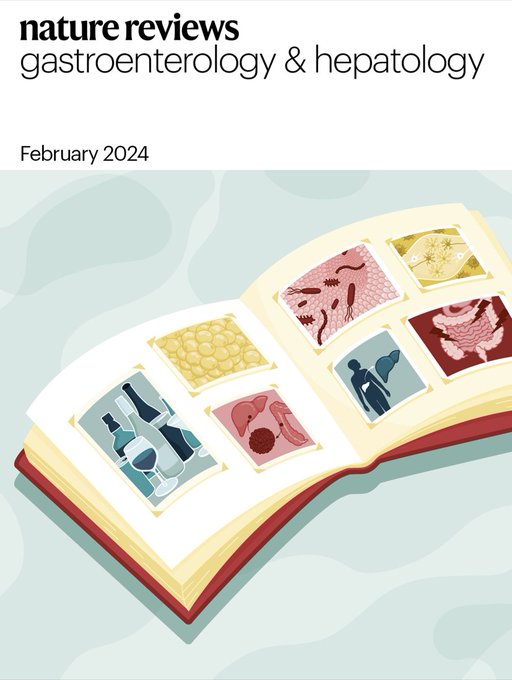Artificial intelligence in liver cancer — new tools for research and patient management
IF 45.9
1区 医学
Q1 GASTROENTEROLOGY & HEPATOLOGY
引用次数: 0
Abstract
Liver cancer has high incidence and mortality globally. Artificial intelligence (AI) has advanced rapidly, influencing cancer care. AI systems are already approved for clinical use in some tumour types (for example, colorectal cancer screening). Crucially, research demonstrates that AI can analyse histopathology, radiology and natural language in liver cancer, and can replace manual tasks and access hidden information in routinely available clinical data. However, for liver cancer, few of these applications have translated into large-scale clinical trials or clinically approved products. Here, we advocate for the incorporation of AI in all stages of liver cancer management. We present a taxonomy of AI approaches in liver cancer, highlighting areas with academic and commercial potential, and outline a policy for AI-based liver cancer management, including interdisciplinary training of researchers, clinicians and patients. The potential of AI in liver cancer is immense, but effort is required to ensure that AI can fulfil expectations. Artificial intelligence (AI) is advancing rapidly and is already starting to transform cancer research and care. Here, the authors outline how AI could be incorporated into liver cancer management, highlighting areas with academic, commercial and clinical potential, as well as ongoing progress and pitfalls.


肝癌中的人工智能--研究和患者管理的新工具
肝癌在全球的发病率和死亡率都很高。人工智能(AI)发展迅速,对癌症治疗产生了影响。人工智能系统已被批准用于某些肿瘤类型的临床治疗(例如结肠直肠癌筛查)。最重要的是,研究表明,人工智能可以分析肝癌的组织病理学、放射学和自然语言,并能取代人工任务,获取常规临床数据中隐藏的信息。然而,在肝癌方面,这些应用很少转化为大规模临床试验或临床批准的产品。在此,我们提倡将人工智能纳入肝癌管理的各个阶段。我们对肝癌中的人工智能方法进行了分类,强调了具有学术和商业潜力的领域,并概述了基于人工智能的肝癌管理政策,包括对研究人员、临床医生和患者的跨学科培训。人工智能在肝癌领域的潜力巨大,但需要努力确保人工智能能够实现预期目标。
本文章由计算机程序翻译,如有差异,请以英文原文为准。
求助全文
约1分钟内获得全文
求助全文
来源期刊
CiteScore
52.30
自引率
0.60%
发文量
147
审稿时长
6-12 weeks
期刊介绍:
Nature Reviews Gastroenterology & Hepatology aims to serve as the leading resource for Reviews and commentaries within the scientific and medical communities it caters to. The journal strives to maintain authority, accessibility, and clarity in its published articles, which are complemented by easily understandable figures, tables, and other display items. Dedicated to providing exceptional service to authors, referees, and readers, the editorial team works diligently to maximize the usefulness and impact of each publication.
The journal encompasses a wide range of content types, including Research Highlights, News & Views, Comments, Reviews, Perspectives, and Consensus Statements, all pertinent to gastroenterologists and hepatologists. With its broad scope, Nature Reviews Gastroenterology & Hepatology ensures that its articles reach a diverse audience, aiming for the widest possible dissemination of valuable information.
Nature Reviews Gastroenterology & Hepatology is part of the Nature Reviews portfolio of journals.

 求助内容:
求助内容: 应助结果提醒方式:
应助结果提醒方式:


